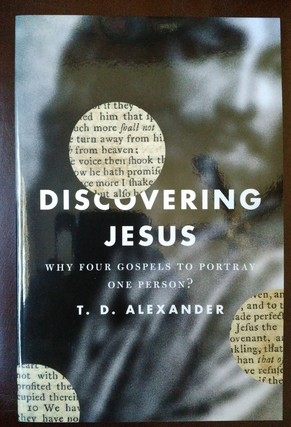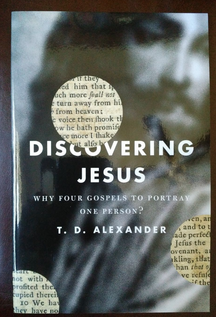| Discovering Jesus by T. D. Alexander In the preface to his book Discovering Jesus, T. D. Alexander asks the following provocative questions: “How do the Gospels of Mark, Matthew, and Luke differ from each other? What is distinctive about each? How does Mark’s picture of Jesus differ from that of Mathew (or Luke, or John)? Why is John’s Gospel quite unlike the others?” He then concludes by challenging, “Even mature Christians will struggle to answer these questions.” |
Before giving this volume a full endorsement, I do believe the reader should be aware of two things:
1. T. D. Alexander holds to Markan priority (the theory that Mark was the first written Gospel and that Luke and Matthew used it for the basis their Gospel design). This is not a deal breaker for recommending the book, but I am not personally convinced of Markan priority. Markan priority is one way of accounting for the material Mark shares with both Matthew and Luke, but does not account for the material Matthew and Luke share that are missing from Mark. Whether Matthew and Luke quote from Mark or Mark quotes from Matthew and Luke is not really of great importance as long as we understand that each writer was independently lead by the inspiration of the Holy Spirit in writing their Gospel. The reason I point out Alexander’s Markan priority background is because it often leads to the problem of “Q”.
2. Though Mr. Alexander does not appear to fully advocate for the existence of “Q”, he does introduce it as a possibility at the close of his book. “Q” comes from the German word “Quelle” and is the title given to an alleged document hypothesized by liberal scholars. According to liberal scholars Matthew and Luke copied (plagiarized?) from Mark and “Q” rather than writing an independent Gospel by means of inspiration. The reasoning goes like this: Since 80%-90% of Mark is found in Matthew and +60% in Luke, Matthew and Luke must have copied from Mark. In areas where Matthew and Luke share material that is not found in Mark, there must be a document (“Q”) from which they both drew copied.
The major problem with the “Q” theory (though certainly not the only ones) is that it attacks the inspiration of the New Testament. There is no manuscript evidence for “Q”, no one has ever seen the alleged “Q”, nor are liberal scholars agreed upon what all should be found in “Q”. The theory of “Q” exists solely as an attack on the doctrine of inspiration and was devised by heretics who had become dissatisfied with portions of the inspired Word.
Though Mr. Alexander does not fully endorse the “Q” theory, he does make readers aware of its existence and considers it a possibility. For this reason I feel compelled to expose “Q” for what it is and warn Bible students to flee from it.
For those wanting to know more about the “Q” controversy, The Case Against “Q” by Mark Goodacare is a scholarly work (this means it’s a rather thorough, tedious, and difficult read) that is currently rocking the foundation of “Q” advocates world.
Despite Alexander’s preference toward Markan priority and his introduction to “Q” and the close of the book, I believe there is much to be learned from his well written introduction to the Gospels. May we all learn to appreciate each Gospel independently and recognize the role it played in spreading the Gospel of Christ.



 RSS Feed
RSS Feed
